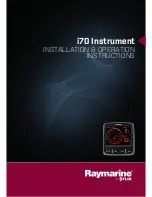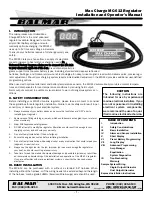
5.3.3
Conductor Locating Function
The instrument may also be used to locate and assign unlabelled RF45 connec-
tions. The instrument recognises coding plugs terminating
Plug-on the coding plug (9) on top of the adapter cable on the one side of
the cable path to be chekked (e.g. within the patch field).
Also connect the cable test instrument via an adapter cable to the other side
of the assumed cable path (e.g. connection socket) via RJ45 test connec-
tion socket (6).
If a coding plug is recognised, the printed code is directly displayed and both cable
ends can be labelled accordingly. If no connection is present to the coding plug,
the 14-segment display indicates ”OP” and all 4 red LEDs are illuminated. If the
cable has been assigned and labelled, the coding plug can be plugged onto the next
cable path and the procedure can be repeated.
The printed-on coding is indicated for every correctly wired pair. The cable lo-
cating function can also be used for incorrectly wired cable paths. However,
at least one correctly wired pair must be available.
6.0 Maintenance
When using the instrument in compliance with the instruction manual, no special
maintenance is required. Should application problems occur during daily use, plea-
se do not hesitate to contact our Hotline, phone (49) 7684/8009-429 with our con-
sulting service department, at your disposal free of charge.
6.1 Cleaning
If the instrument is dirty after daily usage, it is advised to clean it by using a humid
cloth and mild household detergents.
Prior to cleaning ensure that the instrument is switched off and disconnected
from other devices (such as UUT).
Never use acid detergents or dissolvents for cleaning
36
















































